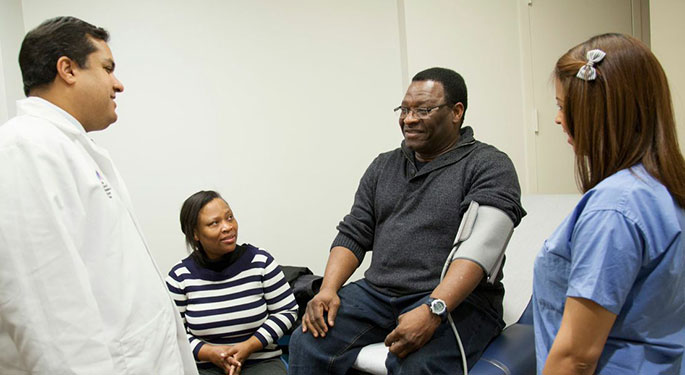Kidney Cancer

Kidney cancer, also called renal cancer, starts in the kidneys, the two bean-shaped organs located about midway down the back on each side of the backbone. The kidneys filter excess water, salt, and waste to create urine and release important hormones. You can survive with only one kidney. It is one of the ten most common forms of cancer in both men and women and approximately 50,000 Americans are diagnosed with the disease each year, according to the American Cancer Society.
Mount Sinai’s Comprehensive Kidney Cancer and Robotic Kidney Cancer Surgery Program is led by Ketan K. Badani, MD, Vice Chairman of Urology and Robotic Operations for the Mount Sinai Health System and Director of Robotic Surgery for Mount Sinai, Mount Sinai St. Luke’s, and Mount Sinai Roosevelt Hospitals. Our multispecialty program spans service areas such as nephrology, interventional radiology, medical oncology, and complementary medicine and work closely with radiology and medical oncology experts. We offer all treatment modalities for kidney cancer including radical and partial nephrectomy, ablation, and active surveillance. We offer individualized care to patients with kidney cancer based on tumor stage, grade, and overall health.
Types of Kidney Cancer
There are several types of kidney cancer.
Renal Cell Carcinoma
Renal cell carcinoma (RCC), also known as renal cell cancer or renal cell adenocarcinoma, is the most common form and is responsible for about 90 percent of all cases. RCC typically grows as one tumor in a kidney, but not in every case. There are several subcategories of RCC.
- Clear cell renal cell carcinoma is the most common form of RCC, representing about 70 percent of all RCC patients.
- Papillary RCC, also known as Type 1 papillary renal cell carcinoma, is the second most common, with particularly high incidence among African Americans. These tumors form little finger-like projections (called papillae).
- Chromophobe RCC is a relatively rare type, with pale, large cells.
- Rare types of RCC include collecting duct RCC; multilocular cystic RCC medullary carcinoma; mucinous tubular and spindle cell carcinoma; neuroblastoma-associated RCC; and renal oncocytoma (benign kidney tumor).
Other types of Kidney Cancers
While less common, there are other types of kidney cancers.
- Transitional cell carcinoma, also known as urothelial carcinoma, is a rare form of kidney cancer that can affect the kidney, ureter, and bladder. We treat this condition by removing the ureter and kidney (called nephroureterectomy) and about 90 percent of these cases can be cured.
- Wilm’s tumor is a childhood form of kidney cancer. About 9 out of 10 children with kidney cancer have Wilms tumors. It typically affects only one kidney and is often quite large before it is discovered.
- Renal sarcomas begin in the blood vessels or connective tissue of the kidney. This rare condition makes up less than 1 percent of all kidney cancers.
Some kidney tumors are benign, or non-cancerous. Benign kidney tumors can include renal cysts, renal adenomas, oncocytomas, and angiomyolipomas. Even though these types of benign tumors will not spread to other parts of the body (metastasize), they can still present problems and should be treated.
Risk Factors
There is no way to know for certain if you will develop kidney cancer. However, a variety of lifestyle- and occupation-related factors may make you more likely to develop kidney cancer, including if you:
- Smoke cigarettes or use tobacco in any form
- Are very overweight (obese)
- Have high blood pressure (hypertension)
- Have a family history of kidney cancer or certain conditions, like Von Hippel-Lindau disease and hereditary papillary renal cell carcinoma
- Are exposed to certain chemicals in the workplace including cadmium, asbestos, some herbicides, benzene, and organic solvents
Symptoms
If you have early stages of kidney cancer, you may not have any symptoms of the disease. Those who do experience symptoms, though, are likely to experience the following:
- Blood in your urine
- Persistent pain in your side
- Lump in your side or belly
- Fever
- Severe fatigue
- Unexplained weight loss
Research
The Comprehensive Kidney Cancer Program at Mount Sinai has one of the most robust research and clinical trials programs in the country. Dr. Badani has published extensively on surgical techniques, and outcomes of treatment for kidney cancer. His philosophy is that new discovery and innovation is the cornerstone to medical advancement and improvement in survival and quality of life for the patient.
With thousands of patients with kidney cancer in our clinical database, we are able to perform high-level research to develop new surgical and non-surgical treatments. Dr. Badani’s lab is working hard at testing new technology to determine their value in real practice. This includes looking at new surgical tools as well as innovative genomic sequencing to determine how to individualize treatment for maximum effectiveness.
In collaboration with The Tisch Cancer Institute, we lead clinical trials and coordinate advanced cancer treatment that provide cutting edge care in the hands of our physicians. We are involved with clinical trials testing new drug regimens against the current standard, as well as, offer trials to some patients who otherwise do not have any other options.
